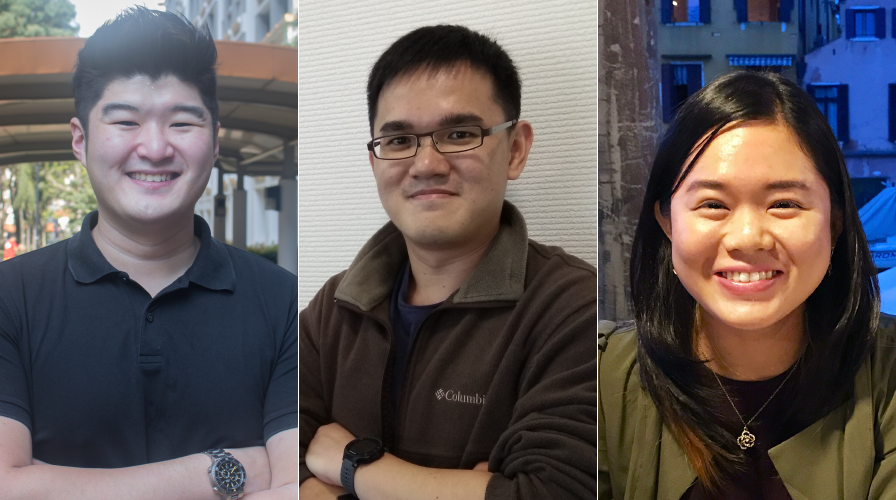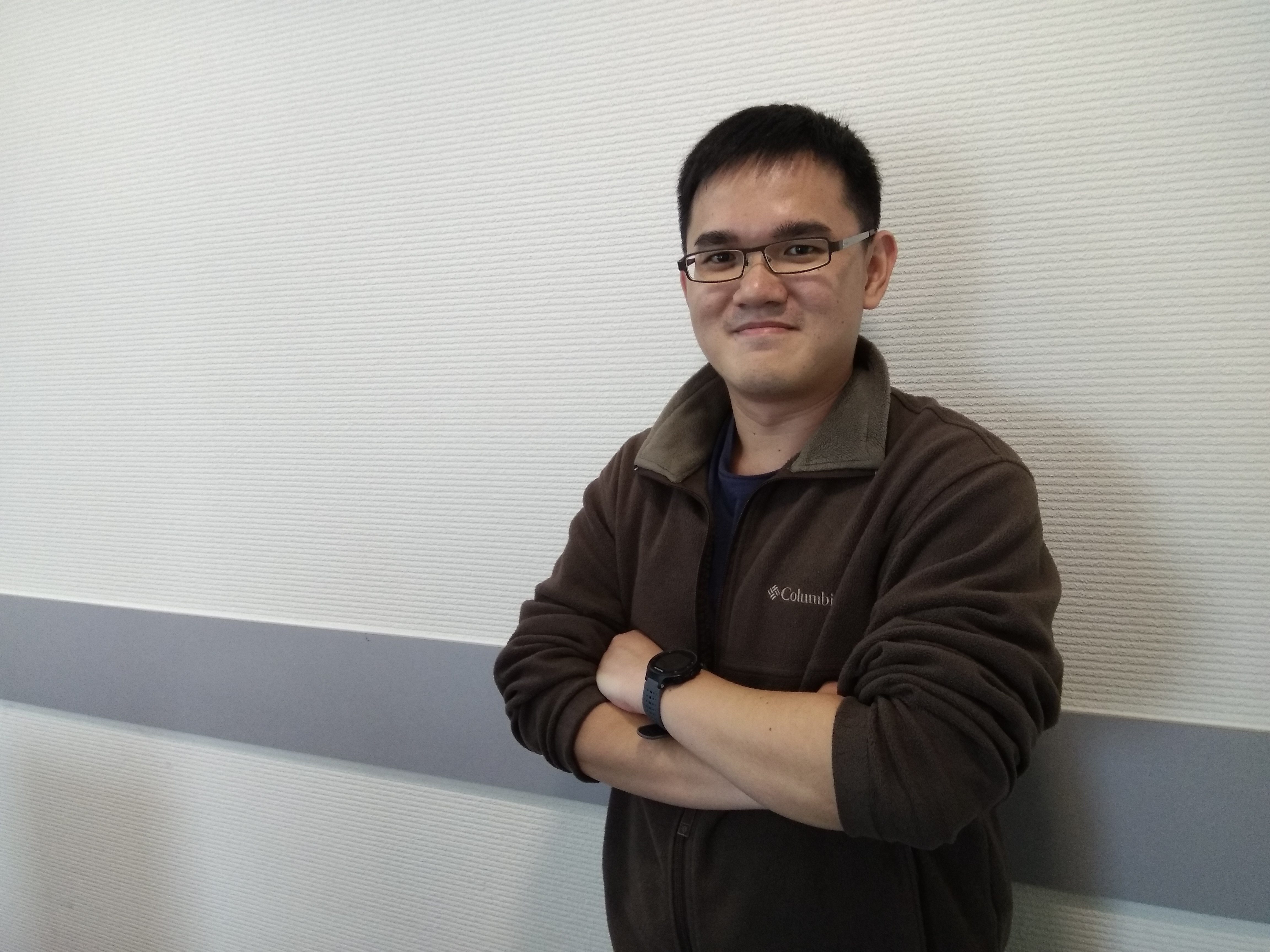
From left to right: Marcus Tan, Lenz Yu, and Lauren Goh.
A hardcore gamer since he was a kid, Marcus Tan enjoyed the popular online role-playing game MapleStory.
When he was 12, however, a hacker attacked his account and stole in-game items worth US$368. “I spent one year accumulating the items. And they were all gone,” Tan recounts.
Jolted by his bad luck – and weak password – he began plotting to hunt the hacker down.
An early calling

A screenshot from MapleStory. Image credit: Euuk.
Tan reached out to MapleStory’s developers and got his hands on the hacker’s details. Shortly after, he traced the lead to a neighboring country. While he didn’t manage to catch the hacker, the incident was still a pivotal experience.
“I knew then my career would involve defeating cybercrimes.”
But it wasn’t until Tan became a student at the Institute of Technical Education (ITE) that he got to work on cybersecurity-related incidents.
But it wasn’t until Tan became a student at the Institute of Technical Education (ITE) that he got to work on cybersecurity-related incidents. By then, he was hooked.
After he graduated from ITE, he took up programming during his National Service stint. Two years later, he applied for the Singtel Cyber Cadet Scholarship program to cover his studies in Infocomm Security Management (DISM) at Singapore Polytechnic.
“ITE was instrumental in building my strong basics, [enabling] me to relate to different cybersecurity technologies. Through the education at Singapore Polytechnic, I was exposed to industry partners, which widened my knowledge of cybersecurity,” he says.
Today, Tan is a cybersecurity associate consultant at Singtel.
“Although my next step is advancing to post-graduate education, I’m grateful to have started from the bottom as the experience has helped shape who I am today,” he explains.
Hard and soft skills – a perfect marriage
It takes more than persistence and grit to get ahead in cybersecurity.
“Tech is not like a cooking recipe. It grows rapidly. We have to keep updating and ensuring we’re up to speed,” Tan explains.

Photo credit: Lenz Yu.
Lenz Yu, a senior security engineer, shares similar views. “I play around with new technologies.”
Before he joined cybersecurity, Yu was in network systems support, filling a role that he describes as being the “tech support guy.” While he appreciated the learning opportunities in his previous job, he found himself craving a much more challenging career.
At a time when cyberattacks were happening in Singapore and the rest of the world, Yu realized that he wanted to play a role in building a safer cyberspace.
He eventually discovered the SkillsFuture Study award for ICT, a government initiative aimed at encouraging Singaporeans to develop and deepen specialist skills needed by future economic growth sectors or in areas of demand. Shortlisted applicants receive a monetary award of US$3,682 (S$5000) to defray out-of-pocket expenses associated with the course they’re pursuing.
With the award, Yu found it easier to commit to the mobile security course he had been eyeing. But he still faced some obstacles.
Weekends were sacred. They were strictly for spending time with his wife and toddler son.
While Yu made it a point to set aside weekday nights for his studies, his weekends were strictly reserved for spending time with his wife and toddler son.
He also got support from his current company, F5 Networks, which allowed him to work flexible hours during the course.
Even so, Yu had to brace himself for exhausting nights. “I had to spend extra time after my class in the evenings to review course materials with my instructor.”
Patience and curiosity won over exhaustion in the end, and now he’s in a career he loves.
“We have to deal with challenges like real-time emergencies and security incidents. It poses a certain degree of challenges because we have to come up with real-time solutions,” he says.
The defenders

Photo credit: Lauren Goh.
“We defend the integrity of the system,” says Lauren Goh, a researcher at iTrust, a center for cybersecurity research at the Singapore University of Technology and Design (SUTD).
At present, she is involved in a cybersecurity project for a water facility with a team of lab engineers, PhD students, and postdoctoral researchers.
Goh used to work at a Singaporean F&B SME. When she realized that none of her fellow employees were well-versed in securing IT systems, her interest in the field grew.
“The skills I’ve learned in my engineering system and design degree were adaptive – I could [adapt them] to any industry,” Goh says. However, she still wanted to supplement her skills with “a formal, in-depth, and educational journey to build a solid foundation in cybersecurity.”
This epiphany led her to pursue a Masters of Science in Security by Design at SUTD with the support of the National Cybersecurity Postgraduate Scholarship (NCPS).
The researcher and part-time student has a new plan in the works. Goh is planning to join Blackzero, a homegrown cybersecurity startup, in the coming months. She will work with a team to build a system that detects security vulnerabilities for owners of large IT networks.
“I see myself working in a role to lead and advance cybersecurity in Singapore,” she shares.
While Tan says Singapore’s Smart Nation initiative “opens more opportunities for innovation, transformation, and new business opportunities,” it’s not without a downside. “Unfortunately, it also attracts more cybercriminals,” says Tan. “We need to be a digitally safe nation.”
He thinks back to the hacking incident that nudged him toward this profession – a reminder that no doubt echoes Yu and Goh’s motives as well.
“I was the victim. Now I’m the attacker and defender.”
If you want to maximize your skills in the ICT field, the TechSkills Accelerator (TeSA) can help. It’s an initiative of SkillsFuture, driven by Infocomm Media Development Authority (IMDA) and in partnership with Workforce Singapore (WSG) and SkillsFuture Singapore (SSG), as well as in collaboration with industry partners and hiring employers.
It is designed to equip budding ICT professionals with the right skills so they can be prepared for the digital economy. Visit their official website to find out about the training opportunities and get ahead.
Besides the programs mentioned in the article, find more pre-approved cybersecurity courses under TeSA’s Critical Infocomm Technology Resource Programme Plus (CITREP+) here.
This series, “Stories from the Ecosystem,” cover features and profiles of people building tech ecosystems around the world.
*Converted from Singaporean dollars. Rate: US$1 = S$1.358. *
This post An ITE graduate, a tech support guy, a career switcher: How 3 people joined cybersecurity appeared first on Tech in Asia.
from Tech in Asia https://www.techinasia.com/ite-graduate-tech-support-guy-career-switcher-3-people-joined-cybersecurity
via IFTTT
No comments:
Post a Comment